

Resilient America Program. Lauren Alexander Augustine, director of the Resilient America Roundtable, spoke at an event on Monday, August 24, 2015 hosted by The Atlantic in New Orleans to mark the tenth anniversary of Hurricane Katrina.
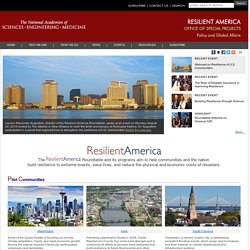
Dr. Augustine participated in a panel that explored how to strengthen the resilience of U.S. communities Watch the webcast. On June 23, 2015, Dr. Kathryn D. Sullivan (NOAA), The Honorable Samuel Adams (World Resources Institute), and Dr. Seattle - Pilot Project. Recent Disasters: Earthquake of 1965 Earthquakes are considered the most serious hazard that Seattle has and will continue to face in the future.
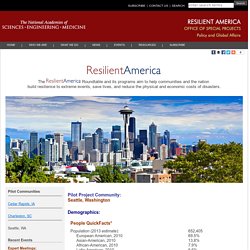
An earthquake with a magnitude of 6.5 occurred in April 1965. The effects were registered at 7 (Very Strong) to 8 (Destructive) on the Modified Mercalli Intensity (MMI) Scale. Six people were killed, mostly by falling debris. Seattle’s topography features many steep hills, and due to its regional climate – which includes very wet winters, the city is prone to landslides. Volcanoes The 1980 eruption of Mt. Tsunami An earthquake on the Seattle Fault about 1,000 years ago produced a 16-ft. tsunami. Sources: The Seattle Hazard Identification & Vulnerability Analysis, City of Seattle, Office of Emergency Management, 2014 USGS Landslide Hazards Program.
Resilient America. Disaster Resilience: A National Imperative. No person or place is immune from disasters or disaster-related losses.
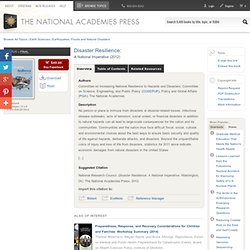
Infectious disease outbreaks, acts of terrorism, social unrest, or financial disasters in addition to natural hazards can all lead to large-scale consequences for the nation and its communities. Communities and the nation thus face difficult fiscal, social, cultural, and environmental choices about the best ways to ensure basic security and quality of life against hazards, deliberate attacks, and disasters. Beyond the unquantifiable costs of injury and loss of life from disasters, statistics for 2011 alone indicate economic damages from natural disasters in the United States exceeded $55 billion, with 14 events costing more than a billion dollars in damages each. The Seattle Hazard Identification & Vulnerability Analysis. U.S. Geological Survey: Natural Hazards. Every year in the United States, natural hazard events threaten lives and livelihoods, resulting in deaths and billions of dollars in damage.
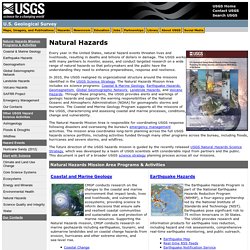
The USGS works with many partners to monitor, assess, and conduct targeted research on a wide range of natural hazards so that policymakers and the public have the understanding they need to enhance preparedness, response and resilience. In 2010, the USGS realigned its organizational structure around the missions identified in the USGS Science Strategy. The Natural Hazards Mission Area includes six science programs: Coastal & Marine Geology, Earthquake Hazards, Geomagnetism, Global Seismographic Network, Landslide Hazards, and Volcano Hazards. Through these programs, the USGS provides alerts and warnings of geologic hazards and supports the warning responsibilities of the National Oceanic and Atmospheric Administration (NOAA) for geomagnetic storms and tsunamis.
Natural Hazards Mission Area Programs & Activities. Emergency Management. Unreinforced masonry (URM) buildings pose a significant risk during an earthquake.
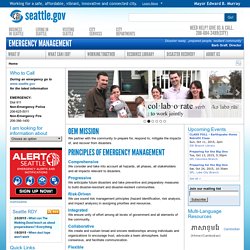
These buildings are typically brick buildings built prior to WWII, and are especially vulnerable during earthquakes because the walls and parapets aren't securely tied to the floors and roof. A 2012 city-wide inventory project identified over 800 potential URMs in the City of Seattle. The Department of Planning and Development continues to work on the Unreinforced Masonry (URM) policy to develop final recommendations for a URM seismic retrofit program.
Click here to read a full update on the progress of the URM seismic retrofit program. When emergencies happen, be the first to know. AlertSeattle is a free service that allows you to sign up online to receive customized alerts via text message, email, voice message, and on social media (Facebook and Twitter). In addition to emergency alerts, you can also choose to receive customizable community notifications. King County Office of Emergency Management. Wildfire response in Washington State Devastating wildfires in the central and eastern part of our state have claimed three lives and affected thousands more.
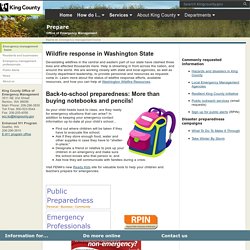
Help is streaming in from across the nation, and around the world. We are working closely with state and local agencies, as well as County department leadership, to provide personnel and resources as requests come in. Learn more about the status of wildfire response efforts, available resources, and how you can help at Washington Wildfire Resources. Back-to-school preparedness: More than buying notebooks and pencils! As your child heads back to class, are they ready for emergency situations that can arise? Visit FEMA's new Ready Kids site for valuable tools to help your children and teachers prepare for emergencies.